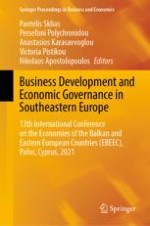2022 | OriginalPaper | Chapter
Turkey’s International Economic Relations: The Nature and the Scope of Turkish Economic Ties with Africa
Author : Victoria Pistikou
Published in: Business Development and Economic Governance in Southeastern Europe
Publisher: Springer International Publishing
Activate our intelligent search to find suitable subject content or patents.
Select sections of text to find matching patents with Artificial Intelligence. powered by
Select sections of text to find additional relevant content using AI-assisted search. powered by
